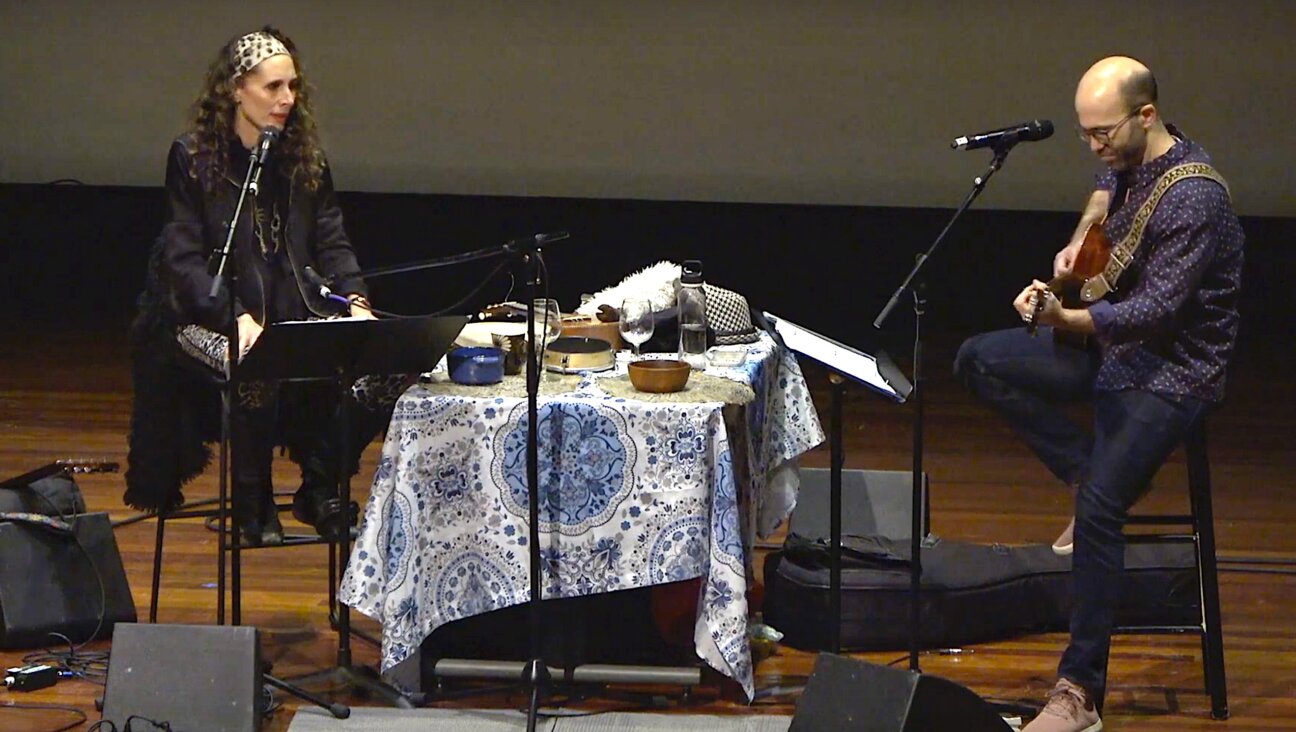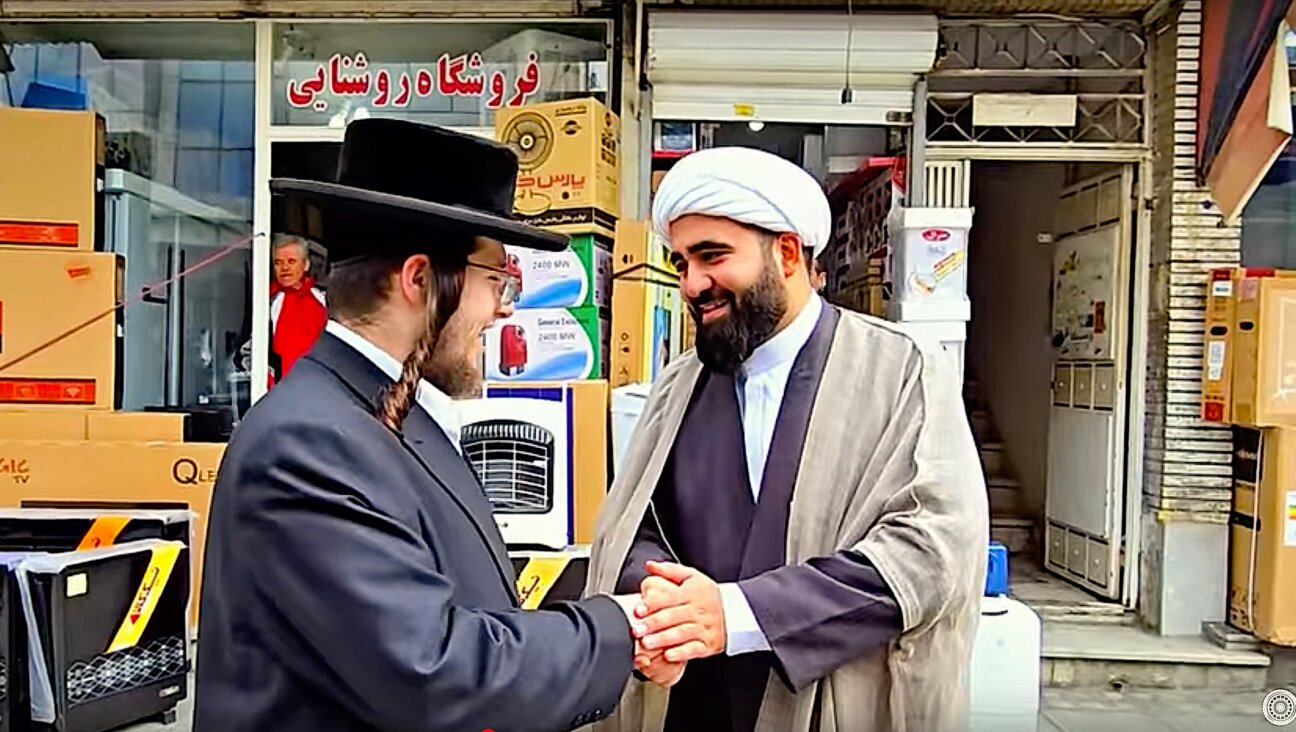Listen to a Forgotten and Revealing Interview With Golda Meir

Golda Meir, shown in January 1964, was not the world’s first female prime minister. Image by Wikimedia Commons
This article originally appeared in the Yiddish Forverts.
I recently gave a talk about the history of the Forward at Yiddish New York, a festival of Jewish culture that was held in Lower Manhattan. The Forward’s archivist Chana Pollack helped me to locate items of historical interest to show during my presentation. Among the various films, photographs and articles describing the news of generations past she gave me a unique recording of an interview with Golda Meir in Yiddish that the journalist Shlomo Ben-Israel had conducted at her offices in Jerusalem. The interview was originally broadcast on the Forward’s radio station WEVD in 1971.
The actual recording itself was made by an elderly Jew in the Bronx, who recorded many of WEVD’s programs onto tapes in his apartment. These tapes were later donated to the YIVO Institute where they remain to this day. The recording was rediscovered after Chana Pollack learned that Shlomo Ben-Israel had conducted several interviews with Meir thanks to records in our archives. After consulting with YIVO the recording was located and digitized by sound archives consultant Matt Temkin.
On the recording the Prime Minister’s voice has the same deep resounding tone that is famous from the films of her in English and Hebrew but yet seems somewhat softer in Yiddish, her mother-tongue. For the most part she sounds entirely comfortable, like someone speaking to an old friend about trivial matters rather than a Prime Minister answering difficult questions from an aggressive journalist. At the same time her characteristic firmness, self-confidence and intelligence are readily apparent. Although her Yiddish may have been a bit rusty by the 1970s she shows no apparent linguistic difficulties during the interview. She speaks very articulately in an unemotional but friendly tone in a cultured Lithuanian Yiddish.
The interview, 26 minutes in length, reveals Meir’s opinions on a whole host of topics in the Jewish world that are still matters of great debate today. Some of these issues are, in fact, far more critical now than they were in Meir’s time.
Ben-Israel begins with a question that no reporter from an American Jewish newspaper would possibly ask Binyamin Netanyahu today: “Mrs. Meir, the Jewish world is worried by a number of developments that show disunity in Israeli life. And in Israeli society one feels a sort of McCarthyist mood, a lynch-atmosphere here in Israel as of late. What can you tell us about that?”
Before turning to Meir’s answer to this surprisingly tough question it’s important to recall the historical context in which it was asked. Golda Meir came to power in 1969, not long after Israel’s dramatic victory against a coalition of Arab armies in the Six Day War of June 1967. With its decisive victory Israel not only ensured its continued survival but captured East Jerusalem and the Old City, the West Bank, the Golan Heights, the Gaza Strip and the Sinai Peninsula. The dramatic victory along with moving images of Jews praying at the Western Wall led to a nationalist fervor that swept not only Israel but the entire Jewish world. At the same time a small but vocal group of Israelis began to warn about the dangers of the continued occupation of Jordanian, Egyptian and Syrian territory. These warnings were, in turn, greeted by many Israelis with scorn and accusations of disloyalty.
Knowing the historical context it seems to me that Ben-Israel’s question to Meir about a “McCarthist mood” and a “lynch-atmosphere” was referring to the reactions of many Israelis to the concerns of some on the Israeli-left (I may of course be mistaken). Meir, for her part, cleverly pivots and interprets the question differently, as if Ben-Israel had asked her about the conflicts between religious and secular Jews in Israel. She addresses these issues by noting that although “(the State) must assure that religious Jews have everything they need to live as they desire” she is concerned by the religious Jews who are making demands upon the Israeli government. “The problems begin when some of the religious Jews want to force everyone in this country to live as they do.” She further explains that “Israel is not a state that was built upon Halacha (Jewish law), rather it’s a state built upon civil law. We do what we can so that we can live together… There are two groups here in Israel and they need to live together.”
Ben-Israel then asks Meir about a range of conflicts that were emerging between religious Jews and the Israeli government. First he mentions the bitter fights over autopsies. Meir explains that Israeli doctors only perform autopsies when they believe that it is absolutely necessary and that doctors cannot be properly trained without studying using cadavers. Meyer reacts to the protests by Haredi Jews in America against Israeli doctors performing autopsies noting that “it’s absurd that Jews, who follow all of the commandments and live in America are leading propaganda efforts against Israel which in certain cases are worse that anything our enemies could compete with.”
Regarding the conflict over religious women serving in the army Meir explains that the claim that religious women are forced to serve against their religious and moral principles and are made to act immodestly is “first of all a lie and a libel. They aren’t forced to go into the army. Secondly, it’s an ugly libel against the women who do go into the army (that they act immodestly).” Meir notes that there are many religious women who serve in the IDF and that those who choose not to join the army may work in hospitals and in religious schools. Meir explains that if a religious woman refuses to perform any form of national service that she will be relieved of her duties and not made to do anything at all.
In one of the few moments during the interview when Meir sounds emotional the Prime Minister tells Ben-Israel about a protest against drafting religious woman that she saw in New York. “The screaming that I’ve now witnessed myself in New York is not only a desecration of the state of Israel but a desecration of God’s name. When a person stands in the street in New York and yells such lies against Israel… And it’s young women and men doing it, who are living comfortably in Williamsburg. They don’t go to war. They don’t risk their lives. And they’re screaming against the state of Israel.”
A little later in the interview Ben-Israel asks about Israeli-Soviet relations. Meir explains that she doesn’t understand why the Russians had recently decided to allow more Jews to leave the USSR. “The laws of logic do not concern the Russian government,” she notes without emotion. The Prime Minister explains that the move was probably the result of two factors: “firstly, the extraordinary heroism with which Russian Jewry is demanding its (right to make) Aliyah” and “secondly, the reverberations, that this has had around the world, first and foremost among Jews but not only among Jews… Even a government like the Soviet government must give in when it finds itself in such a situation.”
After emphasizing that Israel can take in hundreds of thousands of additional immigrants from Russia and that the Jewish State would never close its doors to Jews who want to make Aliyah Meir takes the opportunity to comment on the role of Israel in the Jewish world. “I believe that Israel must see itself as being responsible to a great extent for the future of Jews around the world, for their cultural future and their attachment to the Jewish people and not just their attachment to the Jewish State.” Meir expresses regret for the fact that Israel must stand guard against her external enemies because she would prefer to be able to send young Israelis abroad to “every Jewish community to teach Hebrew, teach about Judaism and to teach that Jews should stay among Jews” than having them serve in the army. She calls for Israel to expand its role in providing Jewish education throughout the Jewish Diaspora and for the Israeli government to support Jewish day schools abroad.
Forty-five years have gone by since Golda Meir and Shlomo Ben-Israel’s conversation and much has changed in the ensuing decades. Looking at the interview in light of the realities of today’s world it’s striking just how current many of the issues they discussed remain. It’s almost superfluous, for instance, to mention that the conflicts between religious and secular Jews in Israel have grown dramatically worse since the time of Golda Meir. Just this month, for instance, hundreds of Haredi Jews rioted in Jerusalem over the medical examiner office’s decision to perform an autopsy on a Jewish infant. The conflict over drafting Haredim into the military, which was a relatively minor issue in Meir’s day, has grown into a debate that can tear apart governing coalitions and bring hundreds of thousands of angry protestors onto the street. The role of Israel in shaping the identity of Jews around the world remains a difficult issue with both positives and negatives (and, of course, much debate about which are which).
Although the context is very different Ben-Israel’s remark about a “McCarthyist mood” and a “lynch atmosphere” sadly remains very current. At a time when the Israeli government is trying to pass legislation to weaken NGOs and ultra-nationalist groups like Im Tirtzu are protesting what they describe as the “traitors” who run them the word “McCarthyist” is sadly an apt description for the tone of civil discourse in today’s Jewish State.
Living in a world in which the most important issue facing Israel is the Israeli-Palestinian conflict and its continuing occupation of the West Bank and lack of internationally-recognized borders it may at first seem bizarre to a listener today that Ben-Israel never asked Meir a single question about these issues. In the years before the Yom Kippur War, however, nearly everyone believed that the situation would be solved through peace negotiations with the relevant Arab states. As we know now, history would take a very different path.
Follow Jordan Kutzik on Twitter @Thrownpeas

Golda Meir, shown in January 1964, was not the world’s first female prime minister. Image by Wikimedia Commons
























